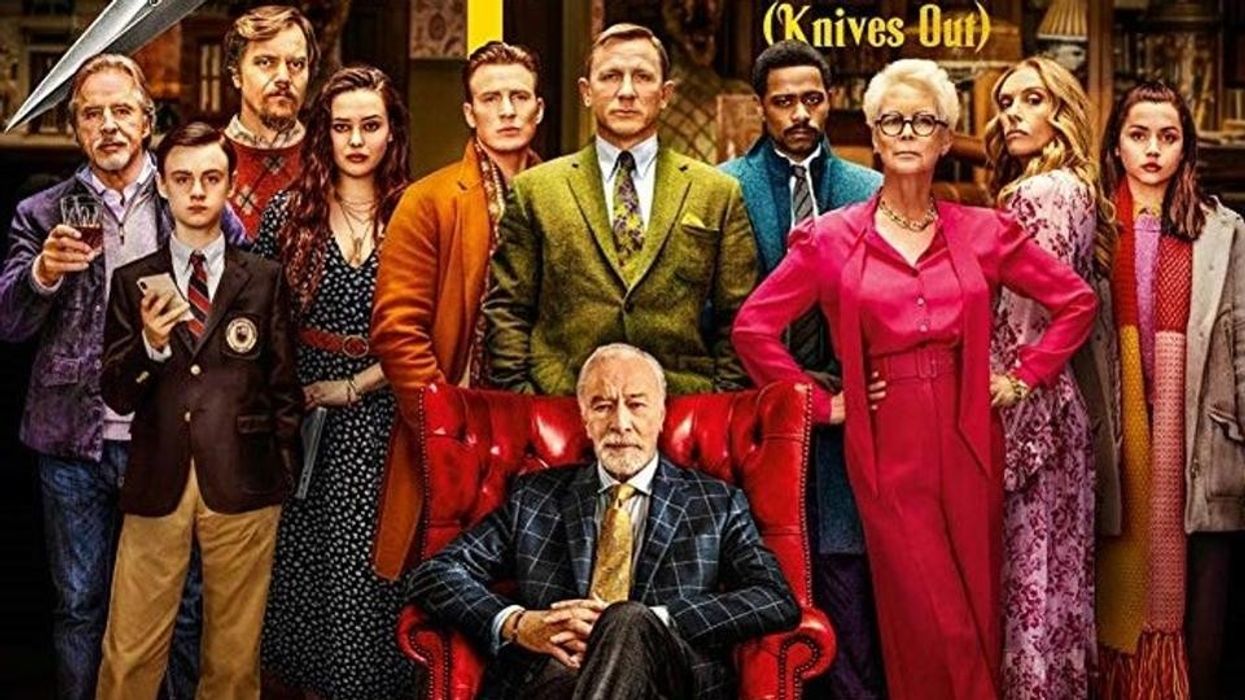Download the 'Knives Out' Screenplay Right Now
Want to learn more about murder mystery screenplays and how Rian Johnson writes? Read and download Knives Out.

SPOILER ALERT: Do not read further if you have yet to see Knives Out. We are going to unpack the script and there will be spoilers.
Murder is one way to bring a family together. A mystery is another.
Rian Johnson's Knives Out is an excellent, original film that gives you twists and turns around every corner. Now, Johnson's screenplay has become available for your reading pleasure. Plus you can download it, take it anywhere, and use it to inspire your next work.
Let's go over the Knives Out script, look at a few pages for inspiration, and talk about what makes a great murder mystery: The characters!
Read and Download the Knives Out screenplay.
I can't believe Ransom (Chris Evans) did it. But then Marta (Ana de Armas) undid it. Kind of. But then her patient and friend, Harlan (Christopher Plummer), redid it -- so it was done.
If that sentence was confusing for you, I am sorry. But that's the way it goes.
Murder Mysteries have, by design, many twists and turns built-in. So when you sit down to write them, you want all the details to flow and every page to be clear and succinct for the reader. You want the pieces of the puzzle to click into place.
One of the most impressive things about Rian Johnson is how cleanly and sparse he writes his action. I am sure he knows what a production designer needs as a jumping-off point and that all the rest he devotes to necessary action.
Looking at the first page here, the mug, which is so important in the film, isn't even here.
That's something we can assume he decided to use while making the movie.
Again, screenplays are only blueprints. Let's look at the opening scene of this blueprint.
There is a great flow to the scenes and that helps make for an easy and effortless read. Want to know the state of the house? We do, in just a few lines:
"The detritus of a party. Stray champagne flutes."
This kind of economy keeps the reader invested as the pages turn.
What about the way Johnson handles flashbacks?
Flashbacks are marked clearly in the slugline. When we return to the present, that's also marked in the slugline.
These flashbacks throughout the story give us a break from the ongoing investigation and deliver clues to the audience so we can try to solve along with the detective.
Let's talk about the big twist!
If you have read or seen the film, the big twist is that Marta accidentally killed Harlan by giving him the wrong medicine. Or so she thinks.
What really happened is, she thought she gave him the wrong medication but didn't. Ransom (Chris Evans) switched the bottles and their labels.
Marta had a feeling something was off, since she literally could tell by the weight and feel and look of the one bottle's contents that one med was different than the other. She was that good at her job. (Which is another thing Johnson does so well, which is re-fill the tank on making her -- our hero -- likable. And always good at what she does, which is care for people.)
In fact, Harlan would still be alive if he let Marta call an ambulance. If he didn't slit his own throat and light the fuse on the events that would burn down his selfish family.
Along the way to getting this information, Johnson subverts expectations fans of the genre are expecting by flipping its tropes. Instead of trying to figure out whodunit, we're rooting for the main character -- Marta -- to cover up the story.
This kind of trope subversion is an incredible way to have your script stand out from the films and books you're homaging.
It also helped us have main characters to root for outside of the main detective, Blanc, played by Daniel Craig. Most of these kinds of movies are structured around the person who comes in to solve the story.
Now, we get the POV of one of the accused. And the pleasure of her and Blanc teaming up in the end to take down the bad guy.
What makes a great murder mystery?
As we talked about in our genre post, each kind of film comes with expectations.
In a murder mystery, we come in expecting strong characters. There's usually a wide cast who all might have motivations to kill. Here. we get two levels. We get the cast, but we also get social commentary.
This a movie about rich white people and their view on the help. Their underlying animosity toward those who are different.
And their determination to get what they think they deserve. Adding these layers to the character development made this story feel fresh and current.
So the next time you sit down to write within this genre, ask yourself if your characters have something current to say about the world.
It could be the difference between you standing out or falling into the pack of unmade screenplays.
What's next? Check out the Pulp Fiction script!
Pulp Fiction was Quentin Tarantino's coming out party in 1994. Now, 25 years later, we look back on its classic script.
Let's see what we can learn!












![Ethos, Pathos, Logos: 20 Effective Ways to Advertise [Infographic]](https://nofilmschool.com/media-library/ethos-pathos-logos-20-effective-ways-to-advertise-infographic.jpg?id=34064614&width=600&height=600&quality=90&coordinates=560%2C0%2C0%2C0)

